Filter by
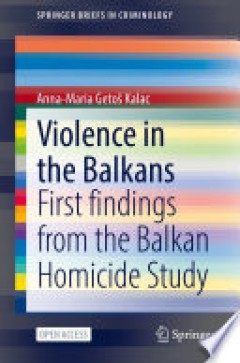
Violence in the Balkans : first findings from the balkan homicide study
This is the first volume to offer an in-depth look at (lethal) violence in the Balkans. The Balkans Homicide Study analyses 3,000 (attempted) homicide cases from Croatia, Hungary, Kosovo, Macedonia, Romania and Slovenia. Shedding light on a region long neglected in terms of empirical violence research, the study at hand asks: - What types of homicides occur in the Balkans? - Who are the perpe…
- Edition
- 1
- ISBN/ISSN
- 9783030744946
- Collation
- XIII, 113 p. : ill.
- Series Title
- First findings from the Balkan Homicide Study
- Call Number
- 364.1509496 GET v

The Provide training course : Contents, Methodology, Evaluation
This volume describes the ideational effort required to design and implement a training-course model for "Experts in proximity violence". The Pilot project design has envisaged a framework where the concepts referring to broad reflections on the topic have be related to the professional skills to be trained. Proximity violence concerns multiple forms of gender-based violence which conceal, in t…
- Edition
- -
- ISBN/ISSN
- 9788835101376
- Collation
- 111p
- Series Title
- Open Sociology - Open Access, 4
- Call Number
- 362.89912094 IGN
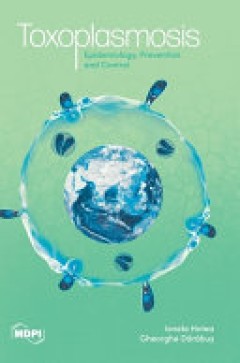
Toxoplasmosis : epidemiology, prevention and control
Scientific motivation to publish this book comes from the increased interest in the study of toxoplasmosis, showed all over the world. Though the Toxoplasma gondii infection was first discovered in 1908, toxoplasmosis remains a today's research topic, a realm of questions and dilemmas that interest both the veterinarians and the human doctors. Studies in the field are directed to the epidemiolo…
- Edition
- -
- ISBN/ISSN
- 9783036526997
- Collation
- ix, 202 p
- Series Title
- -
- Call Number
- 616.936 HOT
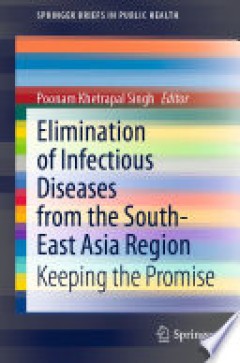
Elimination of Infectious diseases from the south-east asia region : keeping …
This book discusses the historical context, country experience, and best practices that led to eliminating infectious diseases from the WHO’s South-East Asia Region, such as malaria, lymphatic filariasis, yaws, trachoma, and mother-to-child HIV in the mid-twentieth and twenty-first century. The UN Sustainable Development Goals (3.3) targets to end AIDS, tuberculosis, malaria, and neglected t…
- Edition
- -
- ISBN/ISSN
- 9789811655661
- Collation
- XV, 126 p
- Series Title
- -
- Call Number
- 616.90959 POO e
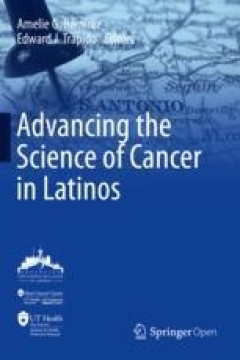
Advancing the science of cancer in latinos
This open access book gives an overview of the sessions, panel discussions, and outcomes of the Advancing the Science of Cancer in Latinos conference, held in February 2018 in San Antonio, Texas, USA, and hosted by the Mays Cancer Center and the Institute for Health Promotion Research at UT Health San Antonio. Latinos – the largest, youngest, and fastest-growing minority group in the Unite…
- Edition
- 1
- ISBN/ISSN
- 9783030292867
- Collation
- xvii; 329 PG; ill
- Series Title
- -
- Call Number
- 614.599908968073 ADV a
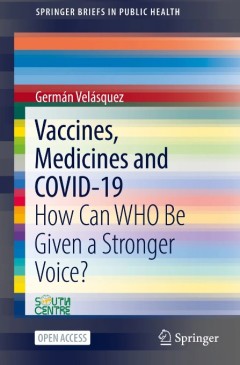
Vaccines, Medicines and COVID-19 : How Can WHO Be Given a Stronger Voice?
This open access book is a collection of research papers on COVID-19 by Germán Velásquez from 2020 and early 2021 that help to answer the question: How can an agency like the World Health Organization (WHO) be given a stronger voice to exercise authority and leadership? The considerable health, economic and social challenges that the world faced at the beginning of 2020 with COVID-19 cont…
- Edition
- -
- ISBN/ISSN
- 9783030891251
- Collation
- xvi, 117 p.
- Series Title
- -
- Call Number
- 362.1962414 VAC G

Genocide Perspectives VI
Genocide Perspectives VI grapples with two core themes: the personal toll of genocide, and processes that facilitate the crime. From political choices governments and leaders make, through to denialism and impunity, the crime of genocide recurs again and again, across the globe. At what cost to individuals and communities? What might the legacy of this criminality be? This collection of essays …
- Edition
- -
- ISBN/ISSN
- -
- Collation
- -
- Series Title
- -
- Call Number
- -

Cybersecurity : public sector threats and responses
The Internet has given rise to new opportunities for the public sector to improve efficiency and better serve constituents. But with an increasing reliance on the Internet, digital tools are also exposing the public sector to new risks. This accessible primer focuses on the convergence of globalization, connectivity, and the migration of public sector functions online. It examines emerging tren…
- Edition
- -
- ISBN/ISSN
- 9781439846643
- Collation
- xxix, 354 p. : ill
- Series Title
- -
- Call Number
- 352.379 AND c
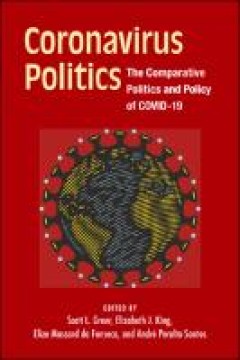
Coronavirus politics : the comparative politics and policy of Covid-19
COVID-19 is the most significant global crisis of any of our lifetimes. The numbers have been stupefying, whether of infection and mortality, the scale of public health measures, or the economic consequences of shutdown. Coronavirus Politics identifies key threads in the global comparative discussion that continue to shed light on COVID-19 and shape debates about what it means for schola…
- Edition
- -
- ISBN/ISSN
- 9780472902460
- Collation
- VIII, 654 p.
- Series Title
- -
- Call Number
- 362.1962414 COR c
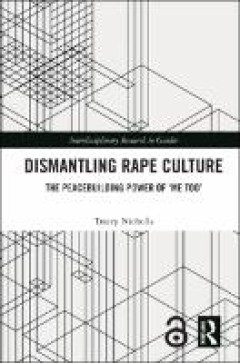
Dismantling rape culture : the peacebuilding power of ‘Me Too’
This book analyses rape culture through the lens of the ‘me too’ era. Drawing feminist theory into conversation with peace studies and improvisation theory, it advocates for peace- building opportunities to transform culture and for the improvisatory resources of ‘culture- jamming’ as a mechanism to dismantle rape culture. The book’s key argument is that cultural attitudes and behavio…
- Edition
- -
- ISBN/ISSN
- 9781003124290
- Collation
- X, 209 p.
- Series Title
- Interdisciplinary Research in Gender
- Call Number
- 305.42 NIC d
 Computer Science, Information & General Works
Computer Science, Information & General Works  Philosophy & Psychology
Philosophy & Psychology  Religion
Religion  Social Sciences
Social Sciences  Language
Language  Pure Science
Pure Science  Applied Sciences
Applied Sciences  Art & Recreation
Art & Recreation  Literature
Literature  History & Geography
History & Geography